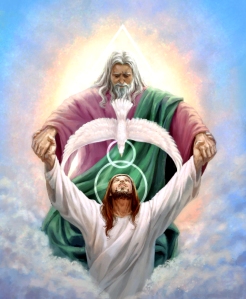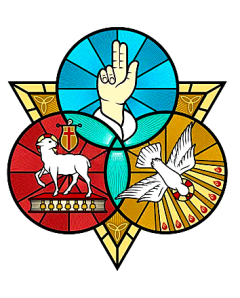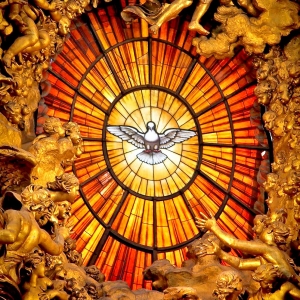
Holy Trinity, Feael, no date.
Click here to read today’s Sunday Mass Readings.
[Jesus said], “Go, therefore, and make disciples of all nations, baptizing them in the name of the Father, and of the Son, and of the Holy Spirit…” Matthew 28:19.
Click on words highlighted in red for further information.
In the year of Our Lord 325 in the ancient city of Nicaea, now the city of Iznic in Türkiye (the new name for Turkey), to the south-east of Istanbul, the Emperor Constantine, recently converted to Christianity, called a meeting of the Christian bishops of the whole church to settle certain questions which were tearing the new church apart. He wanted a peaceful Christianity where all believed the same thing, and worked and worshipped peacefully together (which would also allow him to rule more comfortably and strongly). Paganism was still a major force, and a divided Christianity might well collapse faced with any renewed pagan strength. One of, if not the, principal questions to be asked and answered was Who is God? Although that might seem to be an easy question, it was not. Take, for example, God’s statement in the 26th verse of the first chapter of Genesis: “And now we will make human beings; they will be like us and resemble us” So the question is, who are they if there is only one God? Then there was the question of the Son, Jesus. Was he created by the Father and so had a beginning, or was he “begotten” by the Father from his own being, therefore having no beginning. That dispute, actually a major fight, led to a heresy called Arianism, which claimed Jesus had a beginning rather than being eternal. That was the sort of dispute Nicaea was called to settle. The final document was called the Nicene Creed, the one recited at every Sunday Mass to this day. The question of the Holy Spirit was left to later councils, though considering the final words in today’s gospel reading, there is a clear equality with all Three Persons. That marked the beginning of the doctrine of the Holy Trinity. Last week’s readings were all about love. The nature of love is to be returned. Unrequited love, which is love not returned, is a very painful experience. So the Three Persons in One God are able to love, because it can be returned. With a One-Person God exclusively, that would be impossible: the thought of I love Me (One God) is something we Christians would have much trouble with. It is the nature of love to be returned from another person, certainly possible with one God of more than one Person, impossible otherwise. In fact, that love is so strong that it gave birth to all of us, children of God. Consequently, we are each asked to return that love to our Creator. There is a song which echoes that idea: “Love isn’t love ’till you give it away“ – but true love really has to be returned! There is one other element to be considered when thinking of the Holy Trinity (and those of you who have followed this webpage know what is about to be said). The word spirit in English comes from the Latin word spiritus. The -us ending in Latin means the word has a masculine gender. The Christian Scriptures were all originally written in the Greek that was spoken by everyone in the first century, called koine Greek. In that language, the word, translated as spiritus in Latin, is pneuma, πνεῦμα. We get words such as pneumatic (filled with air) from it. But in Greek that word is neuter, not masculine, not feminine, but neuter. So in English, we would refer to πνεῦμα as “it”. Not acceptable when referring to the Third Person of the Blessed Trinity! Πνεῦμα is a translation of the Hebrew word for spirit, רוּחַ, pronounced ruach (the ch pronounced as in Scottish “loch”). Now, note, in Hebrew the gender of this word is feminine, as is the Hebrew word for wisdom. The word also means breath or wind. So, for example, if Jesus heard us saying “he” for God’s Holy Spirit, he would be as astonished as us hearing “she” for the Holy Spirit! But doesn’t “she” sound better, fuller when considering the Holy Trinity than simply three “he’s”? And that’s the way it should really be. Consequently, the Holy Spirit of God can be considered a she! With that in mind, look with new eyes on the greatest Christian mystery of One God, Three Persons. Father and Spirit eternally uniting to beget the eternal Son. That makes much more sense, especially as each of us is invited into that eternal loving circle, as true love is never exclusive; it spreads out and invites all to enter in. Although God really cannot be tied down to our human definitions, it does help to link our human experience to the nature of God, and see that even with such limited eyesight, we are perhaps more able to enter the mystery of the Trinity. With that, it is so much easier to consider the complete unity of the Trinity, bound together in love, inviting each of us into that embrace. And the Spirit, revealed in the gospels both as “like a dove” at the baptism of Jesus, and “as of flames of fire” at Pentecost, gives us a total horizon of the nature of God’s Holy Spirit, strong, life giving and gentle, easily uniting the nature of femininity with the Father of creation and the Son of redemption. Glory be to the Father and to the Son and to the Holy Spirit inviting each of us to enter that embrace of love and light and remain in eternal happiness there forever.
The Holy Trinity, Dreamstime.
PLEASE FORWARD THIS REFLECTION TO THOSE YOU THINK WOULD APPRECIATE IT.
THANK YOU.
Reflections on next Sunday’s Mass Readings will be posted on Wednesday.
Please send your reactions to: RogerJohn@aol.com
© SundayMassReadings.com

